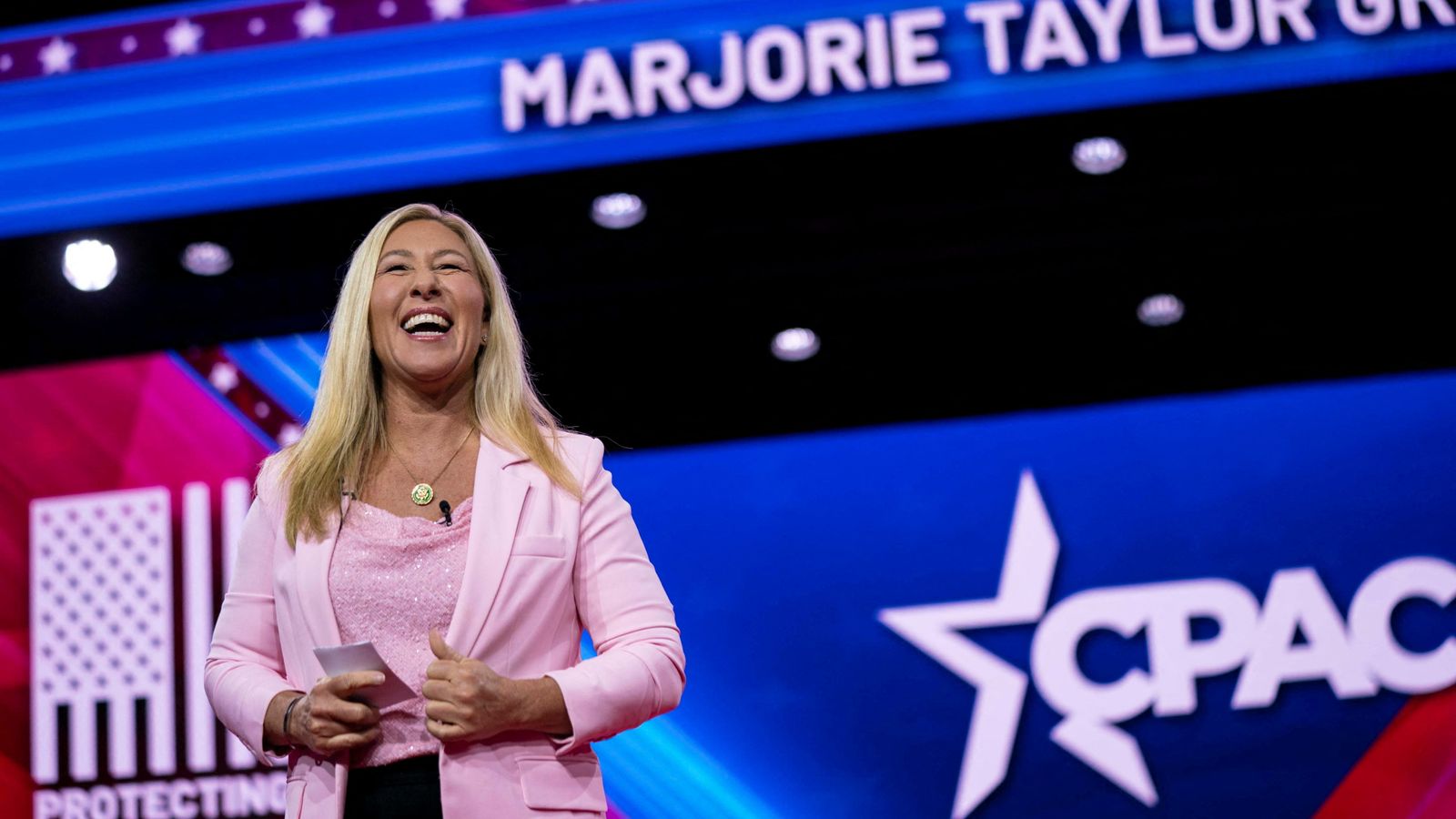
A series of ferocious wildfires erupted across the Los Angeles area on Tuesday, fuelled by powerful winds and dry conditions.
At least five people have been killed and dozens more injured, with many of the remaining fires not contained at all by the emergency services.
Some 130,000 people are now under mandatory evacuation orders across the city.
California wildfires latest: Follow live updates
It is estimated that 1,000 homes, businesses and other structures have burned in the Palisades fire, the largest of the blazes in the south of the city, and Eaton fire alone.
A preliminary review from insurance analysts at JP Morgan estimated that losses from the fires could top $10bn (£8.1bn), Sky News’ US partner network NBC News reported.
Several landmarks have also been destroyed while others, including the Capitol Records building, the TCL Chinese Theatre, the Hollywood Walk of Fame and Hollywood Bowl, fall under evacuation orders.
The Hollywood sign is also near the evacuation area, as is the Griffith Observatory – made famous in the 1955 film Rebel Without A Cause.
Here is everything we know about the blazes, in what fire chiefs have called a “tragic” chapter for the city.
Where are the fires, and how big are they?
There are currently five major fires raging across LA.
Here is a list of how big they are and how “contained” they are – referring to what degree the fire department has them under control.
Palisades fire
A bush fire started the blaze in Pacific Palisades, a Los Angeles County neighbourhood east of Malibu, on Tuesday morning.
By Wednesday afternoon, it had grown to more than 15,000 acres, according to the California Department of Forestry and Fire Protection.
Currently, it is covering at least 17,234 acres and is 0% contained by firefighters.
Eaton fire
The Eaton fire ignited Tuesday night near a canyon in the sprawling national forest lands north of downtown LA and had exploded to more than 10,000 acres by Wednesday, according to the US Forest Service.
Currently, it covers at least 10,600 acres and is 0% contained.
Hurst fire
Also on Tuesday night a fire broke out in Sylmar, a suburban neighbourhood north of San Fernando, after a brush fire.
It quickly grew to 500 acres, and currently covers 855 acres. It is 10% contained.
Lidia fire
The Lidia fire broke out near the community of Acton in a region between the Sierra Pelona and San Gabriel mountains.
Currently, at least 348 acres are affected by the blaze. It is 40% contained.
Sunset fire
The Sunset fire was sparked in the Hollywood Hills of LA, near Runyon Canyon, shortly before 6pm local time on Wednesday, prompting mandatory evacuations.
The blaze currently covers 43 acres and is 0% contained.
The Woodley fire in Sepulveda Basin was “under control” before it grew beyond 30 acres, while a blaze that engulfed Hollywood’s Studio City has now been extinguished, with no casualties.
Olivas fire, a small blaze that erupted in the brush of Ventura County (west of the Palisades and Malibu), was extinguished last night.
Why is this happening in January – and when is wildfire season?
The typical wildfire season in the US usually kicks off mid-year, around May.
But the main culprit for the current blazes in LA is the Santa Ana winds – extreme, dry winds that are common in colder winter months.
Wind speeds of up to 100mph work to spread the flames and coupled with a lack of humidity in the air, and patches of dry vegetation, the ground is much more flammable.
These winds create an “atmospheric blow-dryer” effect that will “dry things out even further”, Daniel Swain, a climate scientist at University of California, Los Angeles (UCLA), said.
The longer the extreme wind persists, the drier the vegetation will become, he said.
Eyewitness: ‘Truly apocalyptic scenes’
California governor Gavin Newsom said fire season has become “year-round in the state of California” despite the state not “traditionally” seeing fires at this time of year – apparently alluding to the impact of climate change.
Why are firefighters running out of water?
The demanding nature of the fires has led to reports that fire hydrants across the city have gone dry.
Wildfire attorney Ari Friedman, a partner and trial attorney at the Los Angeles-based law firm Wisner Baum, put this down to the increased demand simply overwhelming the supply.
But, he said, this “doesn’t immediately point to an equipment or water line failure as a lawyer might think of it”.
Mr Friedman added that the Palisades area, the site of the biggest fire, is served by water tanks because of the area’s high elevation.
Which celebrities have been impacted?
Hollywood celebrities are among the thousands of people who have been evacuated, while some have said they have lost their homes completely due to the fires.
The likes of Paris Hilton and actor Billy Crystal both described the anguish of losing the homes they raised their children in, with the socialite saying she was “heartbroken beyond words” to see her Malibu home “burn to the ground on live TV”.
Oscar-winning songwriter Diane Warren said she had also lost her home of 30 years in the fires, while The Hills stars Spencer Pratt and Heidi Montag also confirmed they had lost their home in the fires.
American presenter and actress Ricki Lake posted on Instagram to say she had lost her “dream home”, the same place she and her husband got married three years ago.
Sky News’ US correspondent Martha Kelner reported that Tom Hanks, Ben Affleck and Reese Witherspoon were all evacuated as wildfires continued to spread in the Pacific Palisades suburb of LA – an area known to be home to billionaires and A-listers.
The havoc caused by the fires has also led to the cancellation of several key dates in the awards season calendar.
The annual Critics Choice Awards ceremony was due to take place this weekend, but has been postponed by two weeks, to 26 January, “due to the catastrophic fires”, organisers said in a statement.
While the nomination voting window for The Oscars has reportedly been extended by two days.
Production on several television programmes, including America’s Got Talent, Loot, Ted, Suits: LA, Happy’s Place and Hacks, is also at a standstill.
What have Trump and Biden said?
The White House said on Wednesday that President Joe Biden approved a major disaster declaration for California that will clear the way for federal funds and resources to be accessed in recovery efforts.
A statement said the president is “focused on mobilising life-saving and life-sustaining resources across the region,” and that he is “praying for those who lost loved ones, had property damaged, were injured, and for everyone affected by this and other devastating fires in the area”.
He has also cancelled his coming trip to Italy to deal with the wildfires.
Meanwhile, president-elect Donald Trump took aim at California’s governor Mr Newsom, repeating claims that firefighters did not have enough water in their hydrants to tackle the blaze.
“It’s a mistake of the governor, and you can say the administration,” he said on Wednesday evening.
“They don’t have any water. They didn’t have water in the fire hydrants. The governor has not done a good job.”
When will the fire weather end?
The winds that have been fuelling the blazes are beginning to drop, but dangerous conditions are expected to persist through until at least Friday, NBC said.
Climate scientist Daniel Swain said some of the driest vegetation will come after the strongest winds have died down, warning: “So the reality is that there’s going to be a very long period of high fire risk.”
A warning for high wind remains in place for parts of greater Los Angeles, including the Malibu coast and the Santa Monica Mountains, according to the National Weather Service.
The forecaster suggests wind speeds could reach up to 60 mph.
Red flag warnings – which are issued by the National Weather Service to warn the public and authorities of imminent weather conditions that may result in extreme fire – are also set to remain in place until at least 6pm local time on Friday.
Humidity levels are expected to stay low, and they could dip into single digits in some areas into Friday.


























